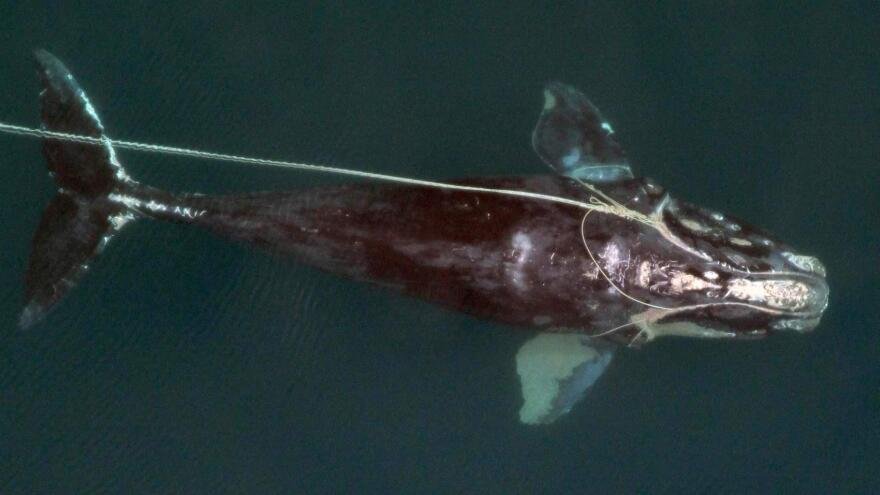U.S. Federal Government Violated the Endangered Species Act by Failing to Protect Right Whales from Lobster Industry, Judge Rules
The North Atlantic right whale is critically endangered with just 336 individuals remaining. By far the biggest threat facing the animals is the fishing industry, with 86 percent of known right whales having been entangled in fishing gear at least once.
Credit: pewtrusts.org
A judge has ruled that the U.S. federal government has failed to adequately protect critically endangered North Atlantic right whales from deadly entanglements in American lobster fishing gear.
U.S. District Judge James E. Boasberg ruled that NOAA Fisheries has violated both the Endangered Species Act and the Marine Mammal Protection Act because not enough was done to reduce the lobster fishery’s lethal threat to right whales.
"For centuries, these whales were imperiled by excessive hunting," he wrote. "But today the greatest human-caused threat comes from entanglement in fishing gear."
His decision comes after more than four-and-a-half years of litigation, during which the right whale population has declined from an estimated 455 to only 336 remaining individuals.
Judge Boasberg’s ruling was a victory for the Center for Biological Diversity, the Conservation Law Foundation, and Defenders of Wildlife, conservation groups that have long sought to protect the right whales from the lobster industry.
“Lobster gear is a deadly threat to right whales, and the courts are telling the federal government to quit stalling and start taking real action. The Biden administration has to work much harder to help the industry prevent these agonizing, deadly entanglements,” said Kristen Monsell, oceans legal director at the Center for Biological Diversity.
“The court’s decision recognizes what NOAA Fisheries has ignored for decades — that Congress clearly intended to protect right whales from the lobster gear entanglements that are driving the species toward extinction just as surely as whaling nearly did,” said Jane Davenport, a senior attorney at Defenders of Wildlife.
The conservation groups filed the lawsuit against NOAA in early 2018. The agency later issued a new rule in mid-2021 to help reduce deadly entanglements in lobster fishing. Despite the changes, the agency admitted that U.S. fisheries will entangle more than 15 percent of the entire right whale population - roughly 55 whales - every year, resulting in at least three deaths or serious injuries.
In light of this, the conservation groups amended their lawsuit to argue that NOAA’s new rule violated the Marine Mammal Protection Act and failed to comply with the Endangered Species Act, leading to this latest court victory.
“For too long, the federal government has failed to act while North Atlantic right whales slip toward extinction,” said Erica Fuller, a senior attorney at the Conservation Law Foundation. “The court’s ruling today makes it clear that fishery managers must do more to protect this species. We must all commit to taking and funding every step necessary, because even one right whale death is too many.”
Credit: NOAA Fisheries
Once common off the U.S. east coast, populations initially decreased due to commercial whale hunting, but nowadays, North Atlantic right whales are facing increasing threats in their key habitats and the ‘blue corridors’ they use to migrate.
Between 2017 and 2021, 34 North Atlantic right whales died off the Canadian and United States coasts due to ship strikes and entanglement in fishing gear, with 86 percent of known right whales having been entangled in fishing gear at least once.
Despite a network of protected areas designed to aid the whales, scientists have recently voiced concerns that the marine mammals have been increasingly roaming away from these protected regions in search of food as the oceans get warmer.
While conservation groups are taking action to protect the right whales from the fishing industry through legal action, scientists are working to prevent ship collisions using technology, including robotic buoys that can provide a general location of the marine mammals in near-real-time.
Woods Hole Oceanographic Institution
What we eat matters
By far the deadliest threat facing whales all around the world is the fishing industry, with the entanglement in fishing gear and “ghost nets” - fishing equipment which is lost or abandoned in the sea - responsible for the death of around 300,000 whales each year.
Choosing plant-based seafood options can help turn the tide on this industry and protect all marine animals. To help you dip your toe into the world of plant-based living, we’ve created a free What We Think, Wear & Eat Starter Kit, available to download here.
We Have A Favor To Ask…
Species Unite amplifies well-researched solutions to some of the most abusive animal industries operating today.
At this crucial moment, with worldwide momentum for change building, it’s vital we share these animal-free solutions with the world - and we need your help.
We’re a nonprofit, and so to keep sharing these solutions, we’re relying on you - with your support, we can continue our essential work in growing a powerful community of animal advocates this year.
More stories:
Species Unite
A collection of stories of those who fight the good fight on behalf of animals.







These places of refuge are not only life-saving when it comes to the animals rescued: they also act as an essential place of education when it comes to animal exploitation.